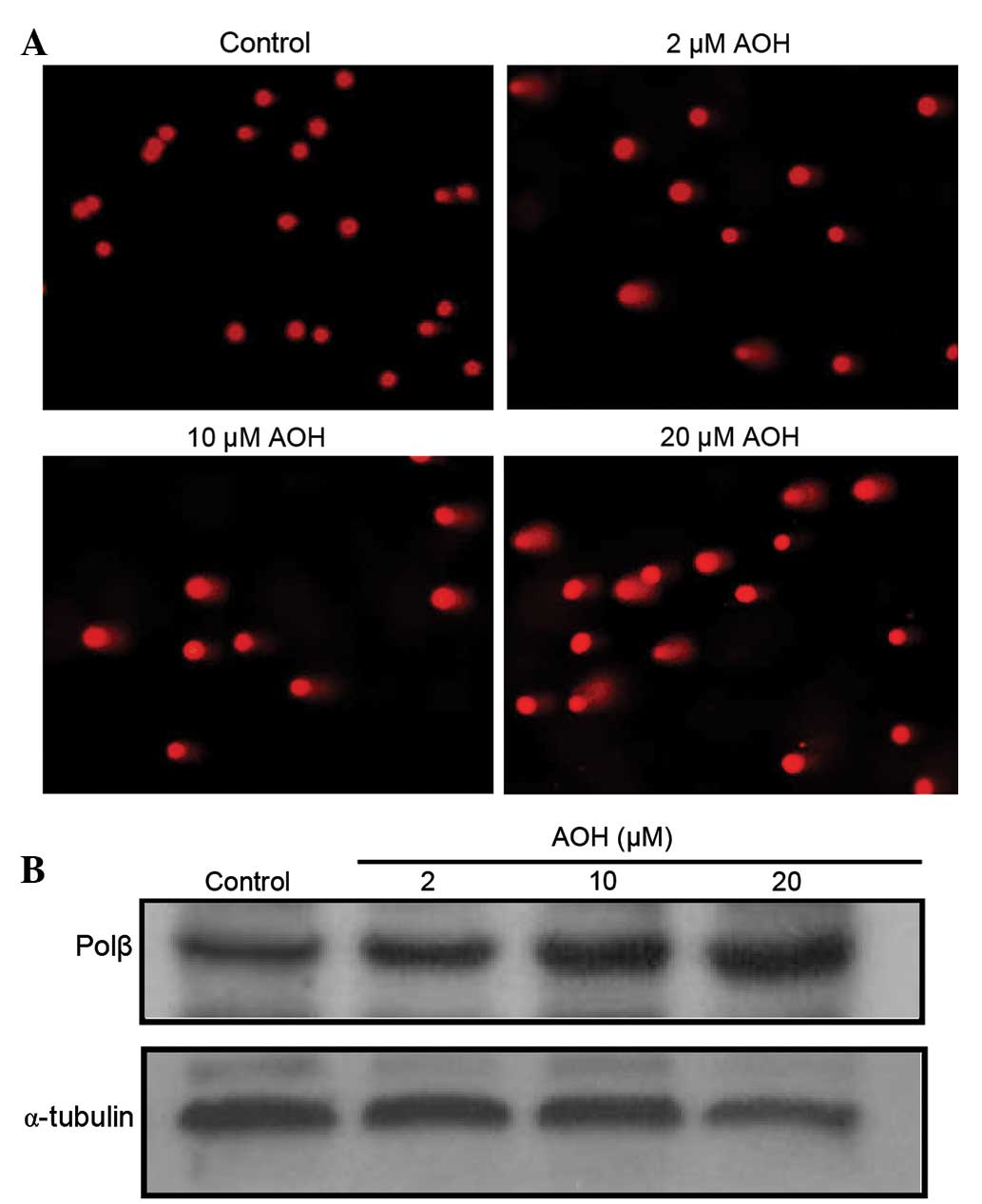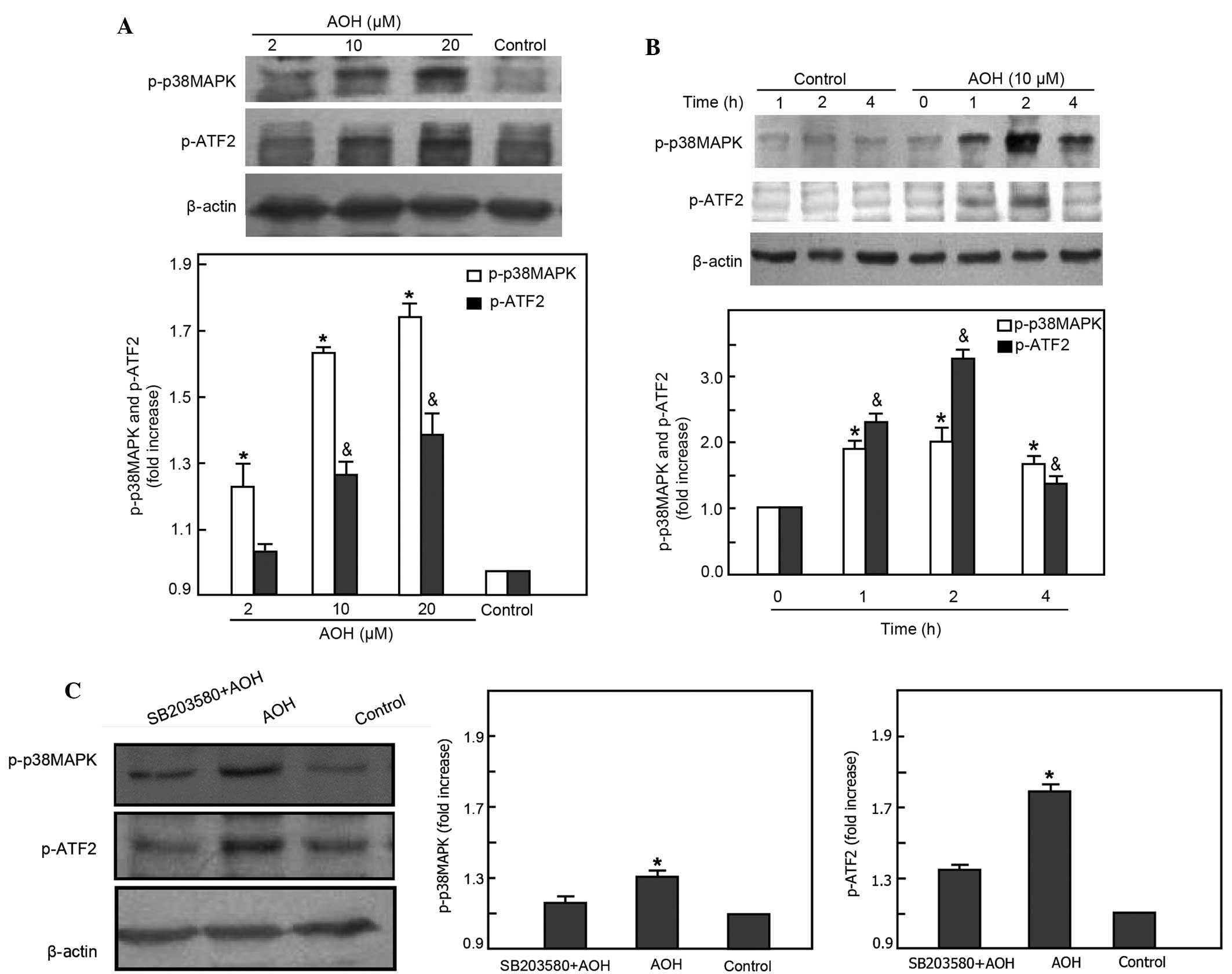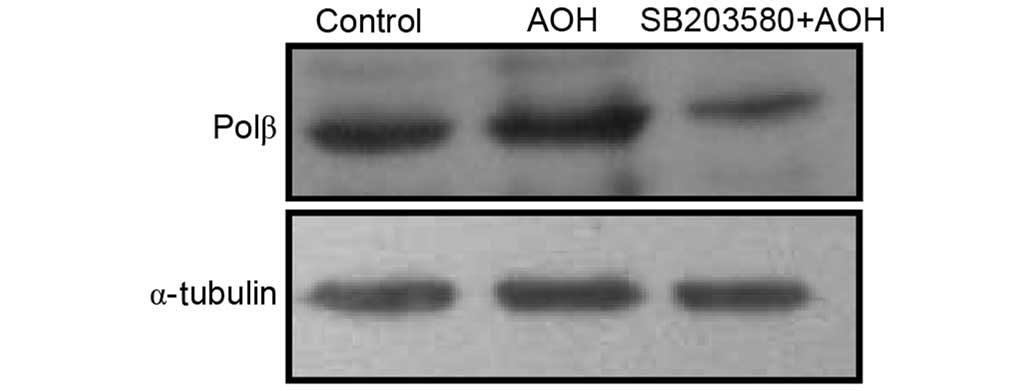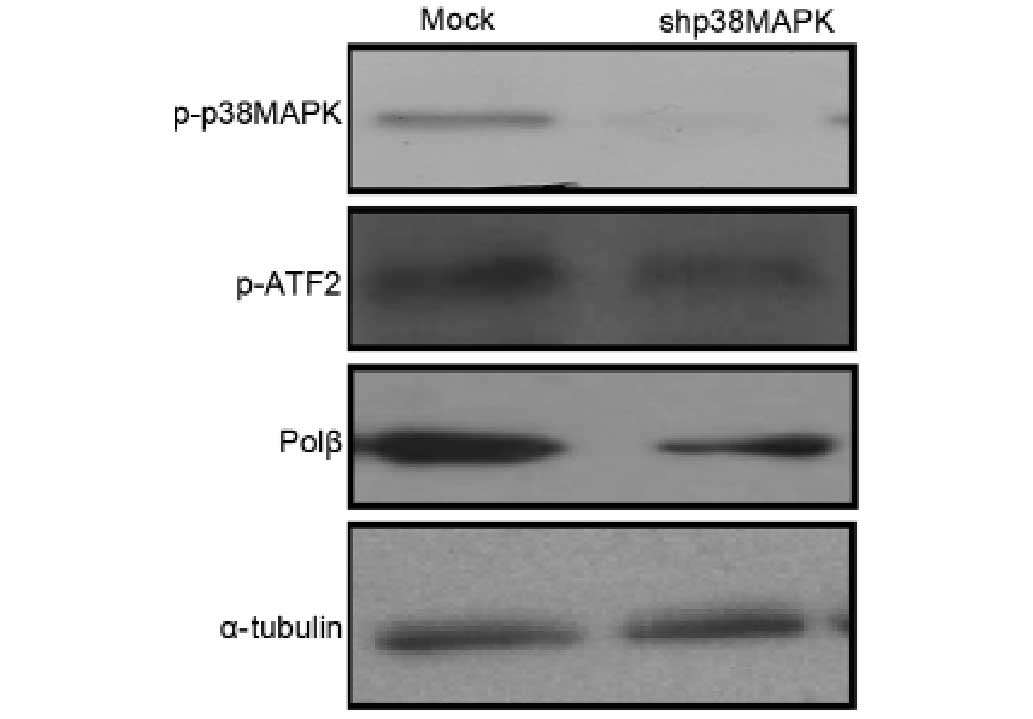|
1
|
Zmudzka BZ, Fornace A, Collins J and
Wilson SH: Characterization of DNA polymerase beta mRNA: Cell-cycle
and growth response in cultured human cells. Nucleic Acids Res.
16:9587–9596. 1988. View Article : Google Scholar : PubMed/NCBI
|
|
2
|
Kim YJ and Wilson DM III: Overview of base
excision repair biochemistry. Curr Mol Pharmacol. 5:3–13. 2012.
View Article : Google Scholar : PubMed/NCBI
|
|
3
|
Kidane D, Dalal S, Keh A, Liu Y, Zelterman
D and Sweasy JB: DNA polymerase beta is critical for genomic
stability of sperm cells. DNA Repair (Amst). 10:390–397. 2011.
View Article : Google Scholar : PubMed/NCBI
|
|
4
|
Cabelof DC, Raffoul JJ, Yanamadala S, Guo
Z and Heydari AR: Induction of DNA polymerase beta-dependent base
excision repair in response to oxidative stress in vivo.
Carcinogenesis. 23:1419–1425. 2002. View Article : Google Scholar : PubMed/NCBI
|
|
5
|
Horton JK, Baker A, Berg BJ, Sobol RW and
Wilson SH: Involvement of DNA polymerase beta in protection against
the cytotoxicity of oxidative DNA damage. DNA Repair (Amst).
1:317–333. 2002. View Article : Google Scholar : PubMed/NCBI
|
|
6
|
Servant L, Cazaux C, Bieth A, Iwai S,
Hanaoka F and Hoffmann JS: A role for DNA polymerase beta in
mutagenic UV lesion bypass. J Biol Chem. 277:50046–50053. 2002.
View Article : Google Scholar : PubMed/NCBI
|
|
7
|
Chan K, Houlbrook S, Zhang QM, Harrison M,
Hickson ID and Dianov GL: Overexpression of DNA polymerase beta
results in an increased rate of frameshift mutations during base
excision repair. Mutagenesis. 22:183–188. 2007. View Article : Google Scholar : PubMed/NCBI
|
|
8
|
Albertella MR, Lau A and O'Connor MJ: The
overexpression of specialized DNA polymerases in cancer. DNA Repair
(Amst). 4:583–593. 2005. View Article : Google Scholar : PubMed/NCBI
|
|
9
|
Tan XH, Zhao M, Pan KF, Dong Y, Dong B,
Feng GJ, Jia G and Lu YY: Frequent mutation related with
overexpression of DNA polymerase beta in primary tumors and
precancerous lesions of human stomach. Cancer Lett. 220:101–114.
2005. View Article : Google Scholar : PubMed/NCBI
|
|
10
|
Yang J, Parsons J, Nicolay NH, Caporali S,
Harrington CF, Singh R, Finch D, D'Atri S, Farmer PB, Johnston PG,
et al: Cells deficient in the base excision repair protein, DNA
polymerase beta, are hypersensitive to oxaliplatin chemotherapy.
Oncogene. 29:463–468. 2010. View Article : Google Scholar : PubMed/NCBI
|
|
11
|
Dong ZM, Zheng NG, Wu JL, Li SK and Wang
YL: Difference in expression level and localization of DNA
polymerase beta among human esophageal cancer focus, adjacent and
corresponding normal tissues. Dis Esophagus. 19:172–176. 2006.
View Article : Google Scholar : PubMed/NCBI
|
|
12
|
Zhao J, Liu K, Lu J, Ma J, Zhang X, Jiang
Y, Yang H, Jin G, Zhao G, Zhao M and Dong Z: Alternariol induces
DNA polymerase β expression through the PKA-CREB signaling pathway.
Int J Oncol. 40:1923–1928. 2012.PubMed/NCBI
|
|
13
|
Vlahopoulos SA, Logotheti S, Mikas D,
Giarika A, Gorgoulis V and Zoumpourlis V: The role of ATF-2 in
oncogenesis. Bioessays. 30:314–327. 2008. View Article : Google Scholar : PubMed/NCBI
|
|
14
|
Gupta S, Campbell D, Dérijard B and Davis
RJ: Transcription factor ATF2 regulation by the JNK signal
transduction pathway. Science. 267:389–393. 1995. View Article : Google Scholar : PubMed/NCBI
|
|
15
|
De Cesare D and Sassone-Corsi P:
Transcriptional regulation by cyclic AMP-responsive factors. Prog
Nucleic Acid Res Mol Biol. 64:343–369. 2000. View Article : Google Scholar : PubMed/NCBI
|
|
16
|
Green TA, Alibhai IN, Unterberg S, Neve
RL, Ghose S, Tamminga CA and Nestler EJ: Induction of activating
transcription factors (ATFs) ATF2, ATF3, and ATF4 in the nucleus
accumbens and their regulation of emotional behavior. J Neurosci.
28:2025–2032. 2008. View Article : Google Scholar : PubMed/NCBI
|
|
17
|
Widen SG and Wilson SH: Mammalian
beta-polymerase promoter: Large-scale purification and properties
of ATF/CREB palindrome binding protein from bovine testes.
Biochemistry. 30:6296–6305. 1991. View Article : Google Scholar : PubMed/NCBI
|
|
18
|
Chijiwa T, Mishima A, Hagiwara M, Sano M,
Hayashi K, Inoue T, Naito K, Toshioka T and Hidaka H: Inhibition of
forskolin-induced neurite outgrowth and protein phosphorylation by
a newly synthesized selective inhibitor of cyclic AMP-dependent
protein kinase,
N-[2-(p-bromocinnamylamino)ethyl]-5-isoquinolinesulfonamide (H-89),
of PC12D pheochromocytoma cells. J Biol Chem. 265:5267–5272.
1990.PubMed/NCBI
|
|
19
|
Yang SH, Sharrocks AD and Whitmarsh AJ:
MAP kinase signalling cascades and transcriptional regulation.
Gene. 513:1–13. 2013. View Article : Google Scholar : PubMed/NCBI
|
|
20
|
Kreideweiss S, Ahlers C, Nordheim A and
Rühlmann A: Ca2+-induced p38/SAPK signalling inhibited by the
immunosuppressant cyclosporin A in human peripheral blood
mononuclear cells. Eur J Biochem. 265:1075–1084. 1999. View Article : Google Scholar : PubMed/NCBI
|
|
21
|
Chyan YJ, Rawson TY and Wilson SH: Cloning
and characterization of a novel member of the human ATF/CREB
family: ATF2 deletion, a potential regulator of the human DNA
polymerase beta promoter. Gene. 312:117–124. 2003. View Article : Google Scholar : PubMed/NCBI
|
|
22
|
Faumont N, Le Clorennec C, Teira P,
Goormachtigh G, Coll J, Canitrot Y, Cazaux C, Hoffmann JS, Brousset
P, Delsol G, et al: Regulation of DNA polymerase beta by the LMP1
oncoprotein of EBV through the nuclear factor-kappaB pathway.
Cancer Res. 69:5177–5185. 2009. View Article : Google Scholar : PubMed/NCBI
|


















